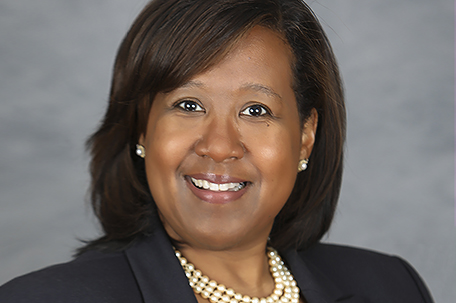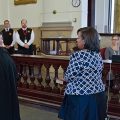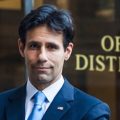
ABOVE PHOTO: Kelley B. Hodge
Kelley Hodge, the City of Philadelphia’s Interim District Attorney, is used to bringing order from crisis.
By Denise Clay
Based purely on her current job, Interim District Attorney for the City of Philadelphia, and one of her last jobs, the first independent Title IX Coordinator for the University of Virginia, you could surmise that Kelley B. Hodge loves a challenge.
As the city’s new District Attorney, Hodge came into an office that’s getting its bearings again after seeing its leader, former District Attorney R. Seth Williams, sent to jail after pleading guilty to a federal bribery charge. The city’s first Black District Attorney is currently in the federal prison on 7th and Arch Streets awaiting his Oct. 24 sentencing.
Before that, she was the first independent coordinator for Title IX—the law prohibiting sexual discrimination in education—at the University of Virginia shortly after the publication of a “Rolling Stone” Magazine story that charged the school with ignoring sexual assault on its campuses.
While the circumstances are different, the ability to understand how the unrest that everyone is going through impacts them and finding ways to help them through that unrest has been the hallmark of her approach to both jobs, especially her current one.
“I didn’t come in with a prescriptive remedy,” Hodge said. “I didn’t presume that the office was broken. I came in wanting to find out what was needed. It would have been poor form for me to come in here and presume what [the prosecutors] needed without talking to them. I want to fill in the gaps and make sure those things are addressed, so I kept my eyes and ears open so I could learn what I could do within the time frame I have because it’s so brief.”
In January, either Democrat Larry Krasner or Republican Beth Grossman will be the District Attorney, but until then Hodge, the first Black woman to hold the office, will be running things. Before going to work for the University of Virginia, Hodge was a public defender in Richmond, Virginia and an assistant District Attorney in the office she currently occupies, serving under Williams and former DA Lynne Abraham.
Hodge was also the Commonwealth’s Safe Schools Advocate under the Pennsylvania Commission on Crime and Delinquency and served as an advocate for victims of violence.
In addition to her degree in Foreign Affairs and Spanish Language and Literature, she is a graduate of the University of Richmond’s T.C. Williams School of Law. She also graduated from Mount Saint Joseph Academy in Flourtown and serves as a mentor for at-risk young women in Philadelphia through the Women of Tomorrow organization. Hodge is also an active member of Alpha Kappa Alpha Sorority Inc.
The SUN talked with the Montgomery County native about her career in the law, what it means to be the first Black woman in the DA’s office, what the new DA will probably face, and why she wasn’t part of the May primary despite seriously considering it.
SUN: First of all DA Hodge, I thank you for your time. I guess that my first question is, what led you to the law, especially the prosecutorial end of it?
KH: I don’t know if I found it, or if it found me, per se. I guess we found each other in terms of being a prosecutor. But in terms of the law, probably, when I was very young, high school, late middle school years, I found myself attracted to law-related shows, things involving the law. My father was part of an organization that took me, and about six of my classmates from my elementary school when we were in seventh or eighth grade, to the Montgomery County Courthouse for Law Day. I just have really vivid memories of going to Law Day at the courthouse, and meeting the judges and standing on the bench and kind of being intrigued by all that was the court building and justice, not really knowing the intricacies, but just knowing that it had to be a very important job. And it peaked my interest and made me say, Hey, maybe that’s something I want to consider doing.
So that just kind of morphed into me going into my high school years and really becoming much more secure in advocacy or having things that were important to me. And my school was a religious-based school and we had a lot of involvement in the community in terms of making sure we connected with the community. I involved myself in Community Service Corps, and things like that, so kind of making sure that you thought about others besides yourself. So that led to my being an advocate for those who aren’t heard. A voice for the voiceless. And that catapulted me into what I studied in undergrad at a UVA and what I did in clinicals when I was in law school. I did clinicals on youth advocacy and it really gave me the chance to get to know the community and take those elements of me that are very much deeply rooted in wanting to go and speak up for people.
SUN: What made you decide to apply for interim District Attorney?
KH: I thought about one, my respect and appreciation for the office. I thought about the fact that I was qualified to do the job. I had managed and supervised in this office. I had taken on responsibilities at the State level in terms of managing and office that dealt with victims of crime, particularly in school settings. I had managed in an office where I had defended people charged with crime. I had also dealt with a great deal of scenarios where the office I either walked into or basically had to construct in terms of building a team around were born out of crisis situations or were following situations where there had been some manner of crisis. So I felt that all of those elements made me uniquely qualified to take on this particular role. While I did not presume to know what the office needed per se, I did put myself in the position of the District Attorneys here as if I had still been here, and what I would have wanted to hopefully know and hear from somebody coming back into this space. I wanted to be a person who basically reflected and represented to them that I understand what the work is, what the task is, what you have to do and I wanted to make sure that the work of the office stood out more than any of the other what had been past distractions that had been going on and surrounding the office that did not relate to the work at hand.
SUN: Were you surprised when they selected you for the job?
KH: I was! When I submitted my application, I didn’t know how many other individuals were also going to be submitting so I didn’t know how large or small the pool of candidates would be and who would be among them, who I would be “competing” against. But hey, I figured I had as good a shot as anybody else and I gave it 100 percent because I felt that I could do the work and do it well. And I knew that in coming back into this space if I was actually selected that I would do this job with the level of respect that this office deserves.
SUN: You’re the first Black woman to be in this office. Even though it’s only for six months, it’s still part of the history of the DA’s office. What does that mean to you? And did you ever think of running yourself?
KH: I did. I did consider running, probably in September of last year. And it was something that I discussed with my husband and I will say a very small select number of individuals who are very close to me that I greatly respect that would not necessarily tell me anything I wanted to hear, but what I needed to hear in terms of when you’re contemplating potentially making and entry into a political race. It was not good timing for me. I had just returned from being in essence out of the state commuting to Virginia to serve as Title IX coordinator in Charlottesville. And it just took an exhaustive toll in terms of not being at home and being in a space to, well, you know be around my husband, my son and my other extended family. So the timing was bad. It’s a huge commitment and I know what the time and commitment would be to do it and do it well. And I wasn’t going to enter into it if I was going to enter into it haphazardly or halfway. It would be an all-in. and I didn’t just have the time commitment at that point. So that was September. And obviously a lot of things transpired between September and the actual primary.
As for the second part of your question, I’m aware of the significance of who I am, and what I am in this role as the first African-American female to be district attorney in this city, one of the largest cities in this country and a city that has a multitude of complexities when we’re trying to address socioeconomic issues and things that regard race, gender, ethnicity and obviously crime, the criminal justice system and our relationship to the criminal justice system. I recognize the significance of where I sit and what I do. And how my race and my gender are important in that. It’s important to me. I embrace who I am wholeheartedly. And I’m proud of the fact that I can actually be this representation. It’s more than that though. I’m actually a representative of a group of African- American women. We’re a small number nationally in terms of African-American women who are prosecutors. And then, to hopefully be an example to others across the country, be it lawyers in general or lawyers who work in criminal law or lawyers who work in criminal law and actually prosecute that they can go forth and be exactly what I am and do what I am currently doing. It’s important. The percentage is low in terms of the “pool of candidates” that actually do this work. I hope that that pool widens and it grows so there is more of us to go and do what [Senator and former California Attorney General] Kamala Harris has done, what other African-American female district attorneys or states attorneys around the country are doing. I’m proud of it, and I’m honored to do it.
SUN: A lot of issues that came up during the campaign regarding this office. The ones that stood out where the issues of cash bail, programs designed to move people out of jail and prison and other forms of restorative justice. Are you looking into any of that? Are there any programs like that that you’re continuing?
KH: I will say that with the programs you’re referring to, diversionary programs in place, none of these programs have been touched. I recently sat down with members of the Courts and the Defenders Association about Mentor, a diversionary program that’s young—it’s in its infancy—that addresses post-conviction reintegration into society. When I was here as an Assistant District Attorney under Lynne Abraham and Seth Williams, I either staffed myself or oversaw the implementation of numerous diversion programs that currently remain in existence. I went to New York to observe the community court model in Brooklyn and Red Hook with the District Attorney’s office and fellow colleagues to see what we could bring back here and implement. I am a believer in trying to prevent crime, taking steps to prevent it by providing options to many in the community to show them that there’s a positive and productive way to achieve what they want is happiness, health and success in their personal life, and I believe that for those people who have committed a crime, have done something wrong, have been found responsible for that, have served a sentence or who are on probation for that, that there is an absolute duty on this office and other offices around the country to try to make sure to that there is no or very little opportunity for recidivism, which means that we have to have programs in place in order to try and facilitate that.
SUN: One of the more high profile cases related to police/community relations in recent months is the shooting death of David Jones. The District Attorney’s office has opted to give this case the Pennsylvania Attorney General’s Office due to a conflict of interest. What exactly was that conflict of interest? Can you tell me that?
KH: I can’t. It’s something that is…basically, it was reviewed by me, it was something that I identified that it was appropriate to take it to the Attorney General’s Office for their consideration. They reviewed it, considered what was presented and agreed, and now it rests with the Attorney General’s office. So to probably speak of anything beyond that wouldn’t be prudent.
SUN: Have there been any other cases? There probably haven’t been that many since you’ve been here.
KH: [The David Jones case] has been the one particular incident that has probably garnered the most attention publicly. There are many things that come across my desk, whether it’s involving matters that would involve the Special Investigations Unit like [the David Jones case] would fall under that venue that I consider. To say that there are lots or there are not lots is a matter of perspective in terms of volume. Let’s just say that the people who I have that I work with, the Deputy that oversees the Special Investigations Unit, Sybil Murphy, and others that work within that division are very, very active in engaging with the police department, the Internal Affairs division, and others to investigate things that come across. And while there are things that may not elevate to the level of my desk all the time, but they are elevated within the space of this office to make sure that they are appropriately investigated and addressed.
SUN: When it comes to police misconduct cases, one thing that sometimes isn’t taken into consideration is the fact that there’s a certain amount of collaboration that has to take place between the Police Department and the District Attorney’s office. The police gather evidence so that the DA can prosecute people who need to be prosecuted. As someone who has worked in this office before, how do you negotiate that? Is there a way to negotiate it so that everyone thinks it’s fair?
KH: I’ll use a different word than negotiate. I’ll say navigate. It’s about communication, active, open communication. As a person who has worked in the realm of criminal justice for almost 20 years, be it as a public defender or be it as a prosecutor, any type of decision that is being made on a matter requires a great deal of communication. And that hinges in large part on having an open and active relationship. There are moments where people agree to disagree. To speak on what posture to take on a matter at the end of the day. Myself, and I’m sure many others who need to make critical decisions along the way, need as much information as possible available to them so that they can make the best decision possible. And that requires active communication. This office, and myself personally, have a great deal of respect for [Commissioner] Richard Ross, the Philadelphia Police Department and for the work they do. There has to be active communication because they gather evidence for us, and that evidence is used to present to a jury who is charged with making decisions.
SUN: Now, you were at the University of Virginia. Was that before or after the Rolling Stone article on campus sexual assault?
KH: I arrived at the University of Virginia just following the Rolling Stone piece. It was on the heels of Rolling Stone that there were a lot of changes made by the University, one of many around the country, to respond, as well as laws being put forth by the legislature to address sexual assault and the response to sexual assault, the awareness of law enforcement of sexual assault on college campuses. I was brought in to be the first independent Title IX coordinator. It was to implement a completely new protocol and policy of how they addressed sexual assault on ground. And to kind of almost be the model, the [Federal] Department of Education called our policy the exemplary model.
SUN: As a student at the University of Virginia, you got to know Charlottesville very well. I’m sure that you’ve heard about the recent White Nationalist rally there that led to the death of one counter protester. Were you surprised that this group chose to use Charlottesville as it’s staging area?
KH: Charlottesville is a beautiful, open-minded college town like similar college towns around the country. There is a lot of open discussion and debate and in nexus with the university, a lot of it is solutions driven.
That said, Charlottesville is a small city in the South and has a lot of history in the form of Confederate monuments like a lot of cities in that part of the country. I lived in Richmond and it has Monument Row. Unfortunately, Charlottesville was selected by these people because it was having a discussion about that monument at the time. Its history was no better or worse in terms of it needing to be addressed.
SUN: If there were one thing that you hoped to accomplish before leaving the District Attorney’s office, what would that be?
KH: I think what I would really like to do something about the opioid epidemic and the impact it’s had. If I could somehow harness a collective effort that involves the work of other stakeholders, we could put together a solid plan to address it that involves prevention and rooting out the people who are bringing it in here. I want this area to stop being a fertile market to peddle this poison. Addiction is a disease and the families that are dealing with it are scared and hurting.
I’d also like to make sure that gun crimes and hate crimes are given an elevated level of attention by this office. We’ve always given them attention, but in light of current events, I want to communicate with my deputies to make sure they’re addressed.
SUN: What’s next for you?
KH: Returning to my law firm and continuing the work I was doing prior to coming back to this office. It was similar to the work that I was doing at UVA; civil rights matters regarding employment and other types of white-collar crime compliance issues.
SUN: Again, thank you for your time, DA Hodge.
KH: Thank you.

















Leave a Comment